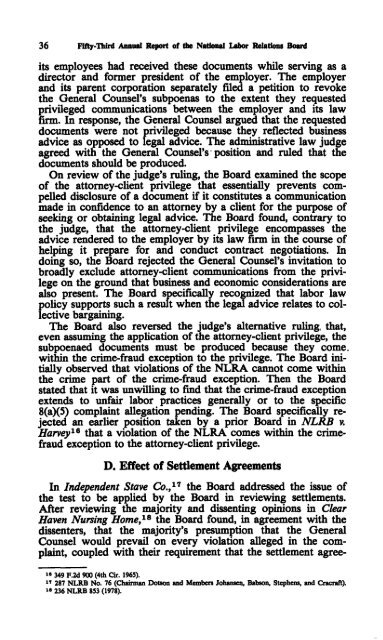Operations In Fiscal Year 1988 - National Labor Relations Board
Operations In Fiscal Year 1988 - National Labor Relations Board
Operations In Fiscal Year 1988 - National Labor Relations Board
You also want an ePaper? Increase the reach of your titles
YUMPU automatically turns print PDFs into web optimized ePapers that Google loves.
36 Fifty-Third Annual Report of the <strong>National</strong> <strong>Labor</strong> <strong>Relations</strong> <strong>Board</strong>its employees had received these documents while serving as adirector and former president of the employer. The employerand its parent corporation separately filed a petition to revokethe General Counsel's subpoenas to the extent they requestedprivileged communications between the employer and its lawfirm. <strong>In</strong> response, the General Counsel argued that the requesteddocuments were not privileged because they reflected businessadvice as opposed to legal advice. The administrative law judgeagreed with the General Counsel's • position and ruled that thedocuments should be produced.On review of the judge's ruling, the <strong>Board</strong> examined the scopeof the attorney-client privilege that essentially prevents compelleddisclosure of a document if it constitutes a communicationmade in confidence to an attorney by a client for the purpose ofseeking or obtaining legal advice. The <strong>Board</strong> found, contrary tothe judge, that the attorney-client privilege encompasses theadvice rendered to the employer by its law firm in the course ofhelping it prepare for and conduct contract negotiations. <strong>In</strong>doing so, the <strong>Board</strong> rejected the General Counsel's invitation tobroadly exclude attorney-client communications from the privilegeon the ground that business and economic considerations arealso present. The <strong>Board</strong> specifically recognized that labor lawpolicy supports such a result when the legal advice relates to collectivebargaining.The <strong>Board</strong> also reversed the judge's alternative ruling, that,even assuming the application of the attorney-client privilege, thesubpoenaed documents must be produced because they come.within the crime-fraud exception to the privilege. The <strong>Board</strong> initiallyobserved that violations of the NLRA cannot come withinthe crime part of the crime-fraud exception. Then the <strong>Board</strong>stated that it was unwilling to find that the crime-fraud exceptionextends to unfair labor practices generally or to the specific8(a)(5) complaint allegation pending. The <strong>Board</strong> specifically rejectedan earlier position taken by a prior <strong>Board</strong> in NLRB v.Harvey" that a violation of the NLRA comes within the crimefraudexception to the attorney-client privilege.D. Effect of Settlement Agreements<strong>In</strong> <strong>In</strong>dependent Stave Co.," the <strong>Board</strong> addressed the issue ofthe test to be applied by the <strong>Board</strong> in reviewing settlements.After reviewing the majority and dissenting opinions in ClearHaven Nursing Home," the <strong>Board</strong> found, in agreement with thedissenters, that the majority's presumption that the GeneralCounsel would prevail on every violation alleged in the complaint,coupled with their requirement that the settlement agreele349 F.2d 900 (4th Cir. 1965).17 287 NLRB No. 76 (Chairman Dotson and Members Johamen, Babson, Stephens, and Cracraft)."236 NLRB 853 (1978).
















